Kyle Fitzgibbons's Blog, page 6
January 30, 2017
16 Books to Understand Trump's America
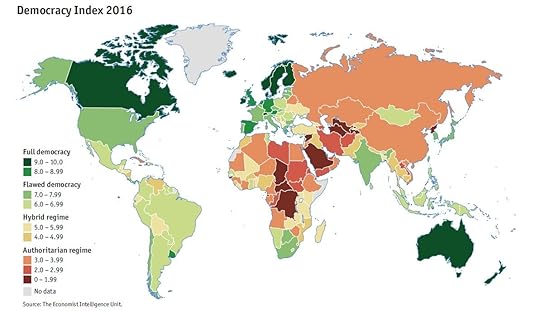 The United States rated as a "flawed democracy" by the Economist Intelligence Unit I was in shock the day of the election this past November. I was quite young when 9/11 happened, relatively speaking. It was my freshman year of highschool and it just didn’t have much of an emotional or cognitive impact on me. Only now do I really understand the consequences of that day. For many others, however, 9/11 was a day that changed their entire worldview, similar to JFK being shot or Pearl Harbor being bombed. Everyone seems to remember what they were doing and where they were.
The United States rated as a "flawed democracy" by the Economist Intelligence Unit I was in shock the day of the election this past November. I was quite young when 9/11 happened, relatively speaking. It was my freshman year of highschool and it just didn’t have much of an emotional or cognitive impact on me. Only now do I really understand the consequences of that day. For many others, however, 9/11 was a day that changed their entire worldview, similar to JFK being shot or Pearl Harbor being bombed. Everyone seems to remember what they were doing and where they were.Donald Trump being elected President of the United States had the same world altering impact on me. It was just beyond the realm of what was possible for Americans to do and beyond my comprehension. In response to not understanding something, I have one habitual reaction.
Read, study, learn.
Below are the books I’ve read since the election and a handful I’d still like to read. Please do let me know if you’ve found anything not on the list worth reading.
Books I’ve Read Since Trump’s Election (Most Recently Read First)Hillbilly ElegyBetween the World and MeThe ALL NEW Don’t Think of an ElephantWhite Rage*The Rise and Fall of American Growth**White TrashTechnocracy in AmericaThe New MinorityThe Shipwrecked MindThe Populist ExplosionThe New Geography of JobsThe Coming Jobs WarMen Without WorkThe Post-American WorldStrangers in Their LandThe Myth of the Rational Voter
Books I’d Still Like to Read (Most Amazon Reviews First)1984Dark MoneyWhat’s the Matter with Kansas?The Politics of ResentmentThose Who Work, Those Who Don’tAsymmetric Politics
* I just started this one, but it’s short.
** I haven’t finished this one yet. It’s massive.
Published on January 30, 2017 07:09
January 28, 2017
Willingly Cuffed: Shedding Idealism

Ex-Scientologist Paul Haggis, director of the Oscar-winning movie Crash, complains that “We lock up a portion of our own mind. We willingly put cuffs on. We willingly avoid things that could cause us pain, if we looked. If we can just believe something, then we don’t have to really think for ourselves, do we?” Which religion is not like that?Indeed, but I’m wondering more and more which society is not like that?
I very much understand that living in a society involves trade-offs. To live together in relative peace and benefit from the positive sum gains of specialization and trade, not to mention security, involves forfeiting one’s right to murder, steal, rape, and slander. That is all for the best.
However, in a recent book titled The Hedonist Manifesto, Michel Onfray described what he considered the difference between Christian atheism and post-Christian atheism. It was an idea that had been independently floating around in my own mind for a while, but without a label or vocabulary to discuss it very clearly.
A Post-Christian AtheismI think the above passage illuminates exactly what it is that we continue to “willingly cuff” ourselves with. There are so many culturally built norms, mores, and expectations of individuals that simply make zero sense in an atheist, liberal, materialist world. Onfray does a great job detailing many of the values that would change or be rethought and reconstructed given you take the world as it is and not how religion or ideology want it to be.
The expression “post-Christian atheism” might strike you as redundant. The substantive alone leads you to believe that one has already gone beyond Christianity and that one is now down off the hill of religion. But by virtue of the Judeo-Christian impregnation of our episteme, atheism itself is forged in the Catholic fire, so much so that there is a Christian atheism and the very term, oxymoronically, characterizes a real conceptual object: a philosophy that clearly denies the existence of God, but also adopts the evangelical values of the religion of Christ.
Thus, the death of God sometimes goes hand in hand with the morality of the Bible. Those who adopt this option deny transcendence and in the next breath defend Christian values in isolation from their theological legitimizations—values that are preserved and honored by virtue of sociological legitimacy. Heaven may be empty, but the world would be better off with the love-thy-neighbor mentality, forgiveness, charity, and other virtues like generosity, compassion, mercy, gratitude, prudence, temperance, and so forth.
A post-Christian atheism emphasizes the principle of the dangerousness of God. It does not deny his existence, but reduces him to his essence: fabricated alienation; a hypostatization of humans’ own impotence; the imagination of an essence outside of oneself; and a projection of essence into an inhuman force. Like Madame Bovary, people do not want to see themselves the way they really are: limited in terms of life span, power, wisdom, and ability. Therefore, they conjure a conceptual personage that possesses the attributes they lack. Thus, God is eternal, immortal, omnipotent, omnipresent, omniscient, and so forth.
As soon as God’s mystery is dispelled, post-Christian atheism makes a second pass, and with the same fervor, it dismantles the values inherited from the New Testament, which impede any real individual sovereignty and limit the vital expansion of subjectivity. Our morality has filled the cemeteries of World War I and has given us the monstrosity of Nazi death camps, Stalinist Gulags, and Hiroshima and Nagasaki; State terrorism of Western fascism and Eastern communism; Pol Pot, Mao, and the Rwandan genocide; and everything else that stains the twentieth century with blood. We cannot keep calling on a beautiful but inactive and impotent Soul, since its incarnation is impossible and it offers no truly attainable effects. We should elaborate a morality that is more modest but that can have real effects. Let’s abandon the ethics of heroes and saints and follow the ethics of the sage.
Onfray, Michel. A Hedonist Manifesto: The Power to Exist (Insurrections: Critical Studies in Religion, Politics, and Culture) (pp. 34-36). Columbia University Press. Kindle Edition.
It will remain forever strange to me that the original sin in Judeo-Christian beliefs was eating from the tree of knowledge and that upon doing so worldly pleasures were equated with sinfulness. This leads naturally to the idolatry of suffering that crystallized so perfectly with the passion of the Christ. There is a lot of suffering in the world, but much of it is our own doing, particularly when we make it an object of worship and disdain pleasure as its better half of life.
I think it’s well past time that we simply stop helping the world by adding to the amount of suffering and simply work to create a world with as much happiness as possible, without fear or disgust at the thought of pleasure. Pleasure isn’t wrong. Enjoy it while it lasts. We get about 80 years to do so, some of which we will spend sick and infirm.
A Minimal List of Pleasures for AllComfortable sleepGood foodClean waterVigorous exerciseAccess to learning/readingCreating and sharing positive work of valueSocial relatedness and closeness with friends and loved onesQuality sexBeautiful environments
Living with and engaging in the available pleasures outlined above is most of what we can ask for from daily life. If we add a sense meaning and purpose to the simple pleasures, we are ninety nine percent of the way to a well-lived life. Let’s take of the cuffs and leave the Christian atheism behind. We have all the power needed to create a world from critical reflection if we just decide to live without the Platonic idealism of the past 2,500 years.
The costs of idealism seem to continually rise, with the list of atrocities by Onfray above being just the tip of the iceberg. A turn to liberal, hedonist, utilitarian, materialism promises to be a life full of greater well-being, happiness, and satisfaction, with less pain, suffering, and death.
Published on January 28, 2017 21:33
January 23, 2017
What Is Progress?
Published on January 23, 2017 22:52
January 21, 2017
Why I’m Not Much Interested in Education PD
 I’m 29 years old, which admittedly is not many years on the planet. I’ve been working in education for 13 years now in various capacities. These include after school programs, tutoring, university teacher assistant, both math and writing labs on college campuses, AVID mentoring, private and public classroom teaching of English, economics, and government, and leadership positions for both international school trips of over 100 people and head of a humanities department of 13 people for the past two years covering grades six through 12 in a secondary school of a thousand students.
I’m 29 years old, which admittedly is not many years on the planet. I’ve been working in education for 13 years now in various capacities. These include after school programs, tutoring, university teacher assistant, both math and writing labs on college campuses, AVID mentoring, private and public classroom teaching of English, economics, and government, and leadership positions for both international school trips of over 100 people and head of a humanities department of 13 people for the past two years covering grades six through 12 in a secondary school of a thousand students.So my entire professional history involves education. And yet, what is not interesting to me any longer is learning about professional development that aims to increase efficiency or effectiveness in schooling children as is. Most learning simply isn’t worth the time and energy we put into it from my viewpoint.
Do I care to get better at literacy teaching when most of that literacy will be used to ingest content the students don’t or shouldn’t care much about? No.
Do I care about learning more ICT so that students can access the same material in new ways? Not really.
Does it seem to make sense to me that we spend thousands of dollars and hundreds of hours on PD for teachers so that they can turn around and decide what, when, and how students will learn anyway? Nope.
The real issue is a lack of seriously intellectually inclined people in the world of education.
I’ve seen many “purposes of education”, but just about all of them involve career employment and citizenship in some capacity. So why do teachers do everything in their power to avoid talking about the future of jobs and citizenship?
If a PD training doesn’t inform me more accurately on what makes the nation or society I live in better or what the future of jobs looks like for students, I’m not interested. I know of very few PD’s that address either of those topics directly and education across the board is pretty terrible at thinking about them. Try to think of the last time you attended a meeting or PD that directly and openly discussed either of those two topics. I’ll wait.
That’s why I much prefer to read books, watch videos, and follow blogs that discuss economics, politics, psychology, and ethics. Those are the central topics of our lived experiences, so those are what I want to know more about and be able to share with students. Because they’re entirely social spheres, they’re also intrinsically interesting to us as social animals and provide all the motivation a person needs to work hard on inventing the next medical technology or manufacturing process that improves millions of lives.
Maybe students would be more literate if they learned, discussed, and debated about life in school on a daily basis. They’d almost certainly be more interested in learning and wanting to learn is a short step away from wanting to read more. So maybe skip the literacy PD and just figure out what's important in our lives. I'm confident that interested students will learn far more than any specific strategy or tactic the next workshop offers.
Published on January 21, 2017 20:18
November 27, 2016
American Viewpoints, both Republican and Democrat
 With all the fact finding, curating, and synthesizing I’ve been doing lately, I’ve been coming to a few conclusions that I won’t bother providing much evidence for in this post, but simply share. You can read my past articles and posts to see what I’ve been reading and gather any evidence you feel needs to be substantiated, the majority of these conclusions are drawn directly from past writings.
With all the fact finding, curating, and synthesizing I’ve been doing lately, I’ve been coming to a few conclusions that I won’t bother providing much evidence for in this post, but simply share. You can read my past articles and posts to see what I’ve been reading and gather any evidence you feel needs to be substantiated, the majority of these conclusions are drawn directly from past writings.Americans seem to be in large agreement on the importance of security, jobs, and healthcare.
To many Republicans, security concerns come in the form of illegal immigration and terrorism, with a bit more worry about crime and drug addiction than Democrats.
To many Democrats, gun violence appears to be the biggest security concern, but a majority is also concerned with drug addiction. While any gun violence is tragedy, both parties seem to make a bigger issue of it than suicide, which takes far more lives and is not only an American, but also a global tragedy.
Jobs for all Americans are important, but particular concern for the working-class is apparent in Republican supporters and I believe much of the anti-trade and anti-immigration positions arise from this in particular. For whatever reason, not much seems to be made of technology and automation by either party, even though it essentially poses the same problems that free trade and migration create (destruction of American labor), but without much possibility in the way of reversing course.
Healthcare is a hugely important issue for all as well, but again takes different perspectives. Republicans tend to place more faith in the free-market and therefore would like to privatize Medicare and Medicaid, while also repealing the Affordable Care Act. Democrats have more trust in the government (and evidence) and would like to continue to see these programs exist and expanded as they tend to have lower total costs of administration than private insurers.
Americans do not seem to agree on the issues of equality, the environment, education, or infrastructure.
Democrats care much more strongly about sexism, racism, the LGTBQ community, and income inequality. I would tend to classify all of these under the topic of equality in some form. We (Democrats) tend to care about all of these issues because we see groups that are being deprived of equal treatment and opportunity. Sexism in particular is almost completely dismissed by Republicans.
Next, Republicans essentially deny or ignore climate change and environmental damage. Some of this is related to jobs (oil and coal) and security (energy independence), but some of it is simply religious fervor around ideas like “the second coming”, that 41 percent of Americans are sure will happen within the next 50 years.
Democrats appear to be much more in-line with the rest of the world on this issue and see an urgent need to engage in agreements like the Paris Accord. Environmental destruction is one of two reasons (the other being nuclear security), Noam Chomsky recently stated that the GOP could realistically be classified as the most dangerous group in human history as they seem intent on rushing the world more quickly to the precipice of collapse.
Education seems to have moderate support by Republicans, depending on the survey and how the question is worded. It is overwhelmingly thought of as important and a big, important issue for Democrats, with many backing changes in higher education affordability. College debt is now huge and seems very reminiscent to the easy money made available for subprime mortgages just a decade ago. This could be a huge problem as an entire generation is saddled with debt and becomes unemployed, underemployed, or leaves the labor force altogether while becoming incapable of paying their loans back.
Finally, the condition of national infrastructure doesn’t get a majority of either party believing it’s a big problem. Democrats give it a bit more attention, but not much on average. This is a bit of shame as much of it is crumbling and in need of repair. This could provide the needed jobs both parties are concerned with and give the nation a chance to redo much of the energy grid to make it more efficient and based more heavily on renewables and green technology.
While it would seem that Democrats are mostly on the right side of many issues (and have a majority of the American voting population in their party), both parties seem to be widely out of step with the importance of prioritizing these issues. The environment and nuclear security should be priority number one. These pose existential threats to both America and the world.
Jobs are hugely important, but rather than focusing on actual jobs being the biggest concern, shared prosperity (the point of jobs) in the age of automated technology and globalization should take the second priority. We need to decide now how we are going to deal with the ever decreasing number of total jobs and what policies are going to work best for the entire society and whether the working and middle classes are left behind or included in future wealth creation.
Of course, shared prosperity as it relates to jobs, income, and wealth, should also relate to equality among sexes, races, and genders. Most of this is going in the right direction, just not as quickly as we might like. It’s undoubtedly better to be a member of any of these groups today than any time in the past. It’d be great to simply wave a magic wand on these points, but they will probably need to wait for time to take its course, with plenty of help from progressives fighting and advocating for proper legislation (and court appointees).
Lastly, health, education, and infrastructure are public goods and should be treated as such. Every person in a nation as rich as America should have the right to free healthcare, higher education up to the doctoral level (or other terminal degree), and access to safe roads, bridges, and dams. Everyone is better off with these public goods functioning well, including both the national economy and local communities
Published on November 27, 2016 07:01
November 25, 2016
"Kyle the Cuckold"
 Christ And The Adulteress, Nicolas Poussin, Original Title: Christ et la femme adultère, Date: 1653 The title of this article is what Greg Fisher, a person I do not know, decided to call me in response to the below Facebook comments between a friend and me about Trump:
Christ And The Adulteress, Nicolas Poussin, Original Title: Christ et la femme adultère, Date: 1653 The title of this article is what Greg Fisher, a person I do not know, decided to call me in response to the below Facebook comments between a friend and me about Trump: Friend: He lied to all his constituents; he promised a break from Wall StreetPutting aside the fact that Greg’s particular derogatory comment makes little to no sense in this context, it is ironic (comical?) that it comes literally a day after my last article on Global Morality and Why It Matters that ended with:
Me: Anyone paying attention to the fact that 70% of his statements are false and only 15% are "true" or "mostly true" would have already known this wasn't a question. I just hope his statements on climate change and nuclear security turn out to be false as well. I also wouldn't mind most of his immigration, trade, health, education, and regulation statements to be false as well... here's to hoping that his track record of being a liar is actually the best quality about him!
Friend: Great point. Why do you think his supporters make excuses for the lies? Do they really believe he's playing 3D chess?
Me: I just think it's frustration and anger. They absolutely knew what they were getting with Hillary. Donald is a big question mark and I think the possibility of it not being more of the same was worth more than the possibility of him destroying the planet.
I believe anything not directly physically harmful, intentionally malicious, or actively oppressive is morally acceptable.The above words in bold are added here for emphasis (not in original) because the term “cuckold” is an attempt to emasculate or deride someone on the basis of sex, specifically a man’s wife having sex with (presumably) another man. To add to the above list of sexual activities, I also have no problem with incest (also not mentioned in the original article) between two consenting adults that are not abusive or the product of abuse. Nor do I have a problem with any particular variety of sex between two healthy, consenting adults including, but not limited to oral, anal, or vaginal sex.
That means I find extramarital affairs, gambling, homosexuality, abortion, premarital sex, alcohol use, divorce, contraception use, having children outside of marriage, medical research using stem cells, polygamy, cloning humans, doctor-assisted suicide, suicide, cloning animals, sex between teenagers, pornography, prostitution, and euthanasia as morally acceptable.
I find the death penalty, medical research on animals, and wearing clothing made from animal fur to be generally morally unacceptable due to the three caveats stated above, with physical harm and active oppression being most relevant for disallowing these actions.
None of this is to say that my marriage with my wife includes any or all of the above. What it does or does not include is not the business of friends, family, local, state, or federal governments. Sex is purely between to consenting parties of legal age and is entirely up to them.
On the specific action of extramarital affairs which was both the target of Greg’s comment and the action considered most morally unacceptable by Pew’s Global Morality survey of 40 countries, I have zero issue with my wife engaging in that action with a few caveats and have said so to her in several conversations. The caveats are simply the ones listed above regarding not physically harming me or intentionally acting out of malice, for example sleeping with my best friend for the sole purpose of wounding me and not for its own sake of sensual pleasure or loving connection.
I can only assume Greg and those like him believe extramarital affairs are a problem for a handful of reasons:
They are worried their partner is not responsible, mature, and honest enough to have sex without bringing home some sort of viral STD such as AIDS and infecting them with a lifelong disease.They fear their wife becoming pregnant by another man and being “forced’ to raise it because they either do not believe abortion is a perfectly legitimate option or have not discussed their views on child raising in enough depth, possibly believing that they are less worthy to be considered a man if they raise a child that is not their own.They are insecure to an infantile degree and believe that physical or emotional connection with another person means their partner thinks less or not at all of them, as though sex and love were zero-sum.They hold some archaic belief of the form “a wife must obey her husband” and see sex as a masculine act of dominance and ownership, thereby giving them the right to dictate with whom and when their partner has sex.They are jealous and too petty to deal with their own internal negative emotions, instead relying on lashing out and accusing others of moral transgressions.
I’ve written at length that I see well-being as being a product of desire satisfaction, goal achievement, and social connection. Sex is a wonderful act that can be additive for both desire satisfaction and social connection.
Fear of contracting an STD from a long-term (to your knowledge) monogamous partner is legitimate and can be avoided through genuine dialog. Fear of being financially responsible for a child you do not wish to have is legitimate, but can also be avoided through proper dialog on joint perspectives of having children. Being insecure is a personal issue and should be dealt with individually, although, again dialog with a caring and loving partner or other can help greatly. Holding an archaic belief about a wife needing to obey you is not legitimate and should be discarded or held with shame. Being jealous is perfectly normal, similar to insecurity, but is another personal issue. It should be handled and coped with in a mature fashion, not by restricting the avenues of happiness, love, and connection of someone else, i.e. your partner, whom you presumably and love and care about greatly and hopefully wish all the happiness in the world.
The word cuckold is not insulting to me in any way and should not be viewed as such to other men either. Women, whether spouses or not can sleep with whomever they wish. If I were a woman, I would take offense at the idea that my personal decisions of who and when I share my body with other people are determined as acceptable by men, but I’m not and women can decide for themselves.
The entire belief system wrapped up in seeing cuckold as an insult is the same belief system that views women as deserving a giant scarlet "A" to wear so that the rest of society can ostracize them. It is the same belief system that is tied to slut shaming, slut being another word that really has no reason to be an insult. It's the same belief system that views women as passive objects for men to conquer, not active subjects who also wish to be fulfilled.
It is patently ridiculous that in 2016 any sex act is considered shameful, unless it is with an unconsenting party, an underage child, or some sort of animal (they can't consent!). In all other cases, sex is good. Do who you want. Do what you want, when you want. Don't be ashamed. Don't let others shame you. Don't be insulted by weak minds.
Published on November 25, 2016 06:08
November 23, 2016
Global Morality and Why It Matters
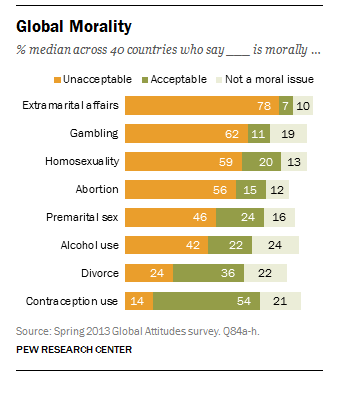 Above are the global median views on what is morally acceptable across 40 countries as reported by the Pew Research Center in 2014. Immediately below are the specifics for what is considered morally unacceptable by Americans, with differences in Republicans and Democrats shown in separate columns.
Above are the global median views on what is morally acceptable across 40 countries as reported by the Pew Research Center in 2014. Immediately below are the specifics for what is considered morally unacceptable by Americans, with differences in Republicans and Democrats shown in separate columns. 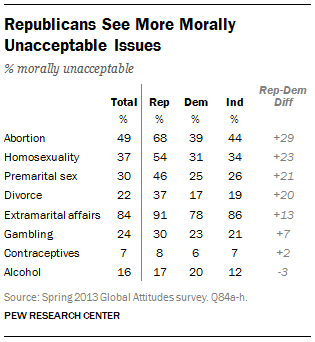 This delineation of what is morally acceptable by political party is fascinating when compared to other regions around the world. It clearly shows that the party that is most concerned with immigration and terrorism (particularly of the "radical Islamic" type) has far more in common with the regions they view as a problem than with Europe as a whole.
This delineation of what is morally acceptable by political party is fascinating when compared to other regions around the world. It clearly shows that the party that is most concerned with immigration and terrorism (particularly of the "radical Islamic" type) has far more in common with the regions they view as a problem than with Europe as a whole. 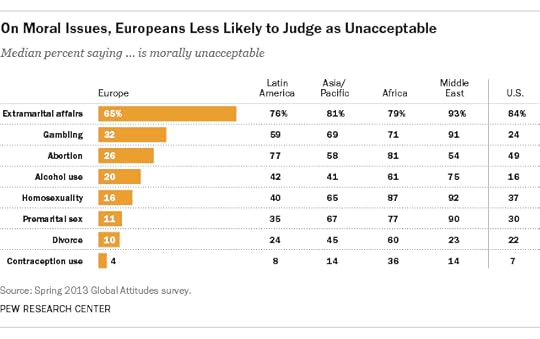 Just to be crystal clear, Republicans are much closer to the Middle East in what they consider to be morally acceptable than they are to Europe as a region, a fact I'm sure they would find shocking and immediately attempt to discredit or deny as false.
Just to be crystal clear, Republicans are much closer to the Middle East in what they consider to be morally acceptable than they are to Europe as a region, a fact I'm sure they would find shocking and immediately attempt to discredit or deny as false.Extramarital affairs: This is found to be morally unacceptable by 65% of Europeans, 78% of Democrats, 91% of Republicans, and 93% of people in the Middle East.
Gambling: This is found to be morally unacceptable by 32% of Europeans, 23% of Democrats, 30% of Republicans, and 91% of people in the Middle East.
Abortion: This is found to be morally unacceptable by 26% of Europeans, 39% of Democrats, 68% of Republicans, and 54% of people in the Middle East.
Alcohol use: This is found to be morally unacceptable by 20% of Europeans, 20% of Democrats, 17% of Republicans, and 75% of people in the Middle East.
Homosexuality: This is found to be morally unacceptable by 16% of Europeans, 31% of Democrats, 54% of Republicans, and 92% of people in the Middle East.
Premarital sex: This is found to be morally unacceptable by 11% of Europeans, 25% of Democrats, 46% of Republicans, and 90% of people in the Middle East.
Divorce: This is found to be morally unacceptable by 10% of Europeans, 17% of Democrats, 37% of Republicans, and 23% of people in the Middle East.
Contraception use: This is found to be morally unacceptable by 4% of Europeans, 6% of Democrats, 8% of Republicans, and 14% of people in the Middle East.
From this data, it is evident that Republicans are actually less liberal than the Middle East on a couple issues, namely abortion and divorce.
Of course, this is not the whole story. A 2015 Gallup survey found that Americans are becoming more liberal on the whole.
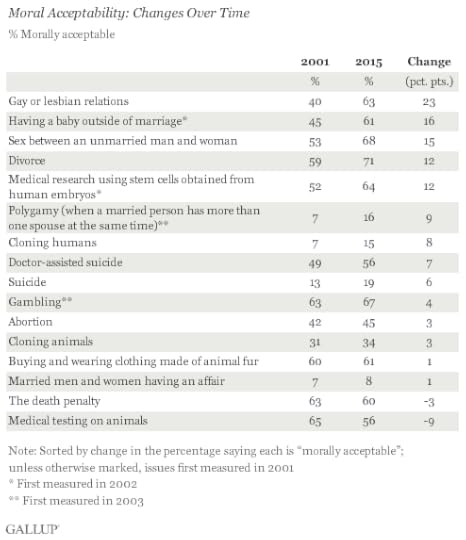 Even with all this positive change in the liberal direction, Americans still have a shocking distance to go. Besides birth control, between 20% and 89% Americans find everything on the list below morally wrong.
Even with all this positive change in the liberal direction, Americans still have a shocking distance to go. Besides birth control, between 20% and 89% Americans find everything on the list below morally wrong. 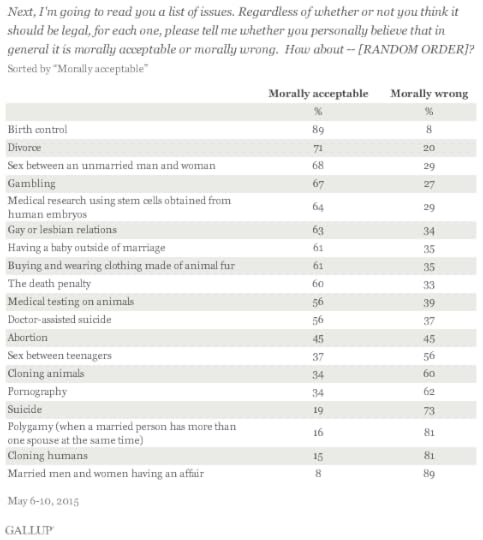 If we look at differences in belief between religious and non-religious groups, we see that the Jewish faith on the whole is largely in alignment with the non-religious in their liberal beliefs, with the various Christian sects being far less liberal with the odd exceptions of the death penalty and wearing clothing made of animal fur where all are more or less in agreement.
If we look at differences in belief between religious and non-religious groups, we see that the Jewish faith on the whole is largely in alignment with the non-religious in their liberal beliefs, with the various Christian sects being far less liberal with the odd exceptions of the death penalty and wearing clothing made of animal fur where all are more or less in agreement. 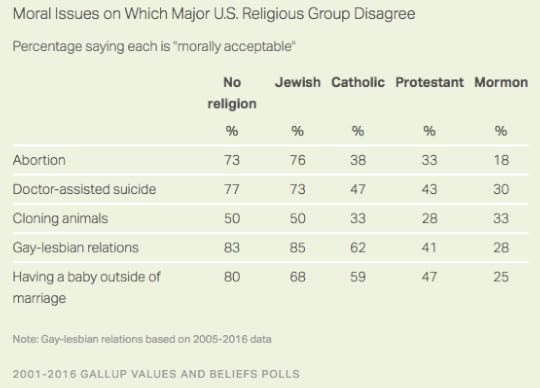
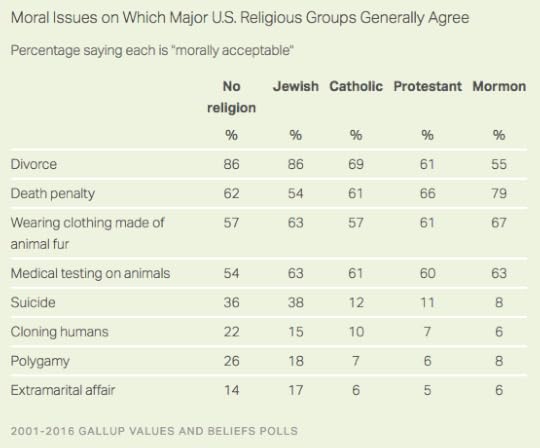 The less liberal beliefs above by Christian Americans are largely mirrored around the world by Muslims as well. A 2013 Pew poll and analysis found that Muslims around the world believe that prostitution, homosexuality, suicide, sex outside of marriage, drinking alcohol, abortion, and euthanasia are morally wrong.
The less liberal beliefs above by Christian Americans are largely mirrored around the world by Muslims as well. A 2013 Pew poll and analysis found that Muslims around the world believe that prostitution, homosexuality, suicide, sex outside of marriage, drinking alcohol, abortion, and euthanasia are morally wrong. 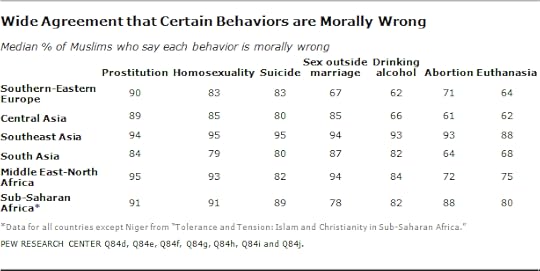 The same poll found overwhelming support within the international Muslim community that "a wife must obey her husband".
The same poll found overwhelming support within the international Muslim community that "a wife must obey her husband". 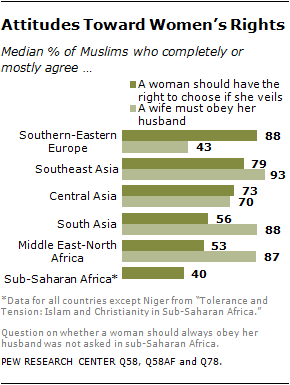 Why This All Matters The above data is important. As George Lakoff says, "All politics is moral". Lakoff has been studying cognitive science, politics, and morality for decades. He is one of the leading experts on the topic. He is not alone.
Why This All Matters The above data is important. As George Lakoff says, "All politics is moral". Lakoff has been studying cognitive science, politics, and morality for decades. He is one of the leading experts on the topic. He is not alone.Jonathan Haidt of Harvard also believes that moral values are what divide us when it comes to politics and religion. Lakoff and Haidt are joined by sociologist Arlie Russell Hochschild of Berkeley and even Aristotle in his class work Politics , written over two millennia ago. This list could go on nearly indefinitely. Morality shapes our politics.
For anyone with a liberal attitude, the above facts of the world are hard to swallow. For myself, it is crippling to realize just how much of an outlier I am. On nearly every issue above, I am with the minority. I believe anything not directly physically harmful, intentionally malicious, or actively oppressive is morally acceptable.
That means I find extramarital affairs, gambling, homosexuality, abortion, premarital sex, alcohol use, divorce, contraception use, having children outside of marriage, medical research using stem cells, polygamy, cloning humans, doctor-assisted suicide, suicide, cloning animals, sex between teenagers, pornography, prostitution, and euthanasia as morally acceptable.
I find the death penalty, medical research on animals, and wearing clothing made from animal fur to be generally morally unacceptable due to the three caveats stated above, with physical harm and active oppression being most relevant for disallowing these actions.
Of course, all of the actions listed as morally acceptable by me can be unacceptable in specific instances. Prostitution and pornography are both clear examples that have many instances of morally unacceptable acts attached to them. However, the specifics do not make them innately morally objectionable in and of themselves.
The notion that we all want the same things is lie. The notion that all Americans want what is best for the country is lie. I am vehemently opposed to the majority of American and global beliefs about morality. Of course, I believe I am right and others believe they are. The main difference is that some people resort to evidence and some resort to metaphysics and superstition.
We can either agree that secular, liberal ideologies are the basis of free and open democracies or we can race to see which group will gain enough power to enforce their beliefs on others. I can only hope and continue to argue that the world, and America in particular, continue to shift to more liberal beliefs about what is morally acceptable.
If you agree, please continue to voice your beliefs through voting and advocacy in whatever sphere you can.
Published on November 23, 2016 19:42
November 15, 2016
Make America Good Again
 I’ve already written about Trump several times. Three articles were before the election and two were after. If you missed them, see below (most recent first):
I’ve already written about Trump several times. Three articles were before the election and two were after. If you missed them, see below (most recent first):I’m Still Angry, but It’s Time for ProgressWhat Needs to Happen NextA Trump Presidency Will Kill Thousands, Possibly MillionsTrump Plans Quote of the DayPresidential Candidate Plans for Achieving American Prosperity
What bothers me quite a bit right now is the reactions I’ve heard spoken to me by several students. Four different students (I teach high school in Singapore) have now asked me if they should stop applying to universities in the United States. All were ernest. This are bright, international students who have a lot to offer. They are now considering not bringing their talents to the United States.
I’ve also personally been told by one close friend living in the United States that they no longer feel safe and that they are questioning whether they could ethically consider bringing a child into the world - at least while living in the United States. Now, I’m still largely against having children, but absolutely not on the grounds of fear-based decision making or feeling ashamed of your country of citizenship. Those are the wrong reasons.
All of this saddens me. I know I’m not the only one hearing these questions and fears voiced. The New York Times reported a large uptick in “bias-based attacks” following the election,
In New York, men shouted, “You’re next!” at a black policewoman, making shooting motions with their hands. In California, a high school student told a classmate, “You support Trump? You hate Mexicans!” before throwing her to the ground and hitting her. Online, anonymous users wrote on Twitter, “Just reported you to ICE. Expect a van at your door tomorrow” to illegal immigrants.Later in the article, a mother tells us what her “12-year-old son experienced at school”,
The boy, whose United States-born parents are of Egyptian descent, had come home complaining that his seventh grade classmates teased him about Mr. Trump’s victory and accused him of being part of the Islamic State.Similarly, Al Jazeera reported a surge in hate crimes against Muslims and “black students at the University of Pennsylvania (UPenn) said they were afraid to attend classes after they were subjected to racial slurs and threats of lynching following the election”.
“He was very devastated — asking if he was going to be kicked out of the country,” she said.
There needs be another way for us to express our anger and frustration. Daron Acemoglu and Larry Summers seem to be correct when they respectively write, “the root of our problems is our inability to create shared prosperity and the unwillingness of the political system to discuss and tackle this problem,” and that “what is needed is responsible nationalism — an approach where it is understood that countries are expected to pursue their citizens’ economic welfare as a primary objective but where their ability to damage the interests of citizens of other countries is circumscribed.”
If they are right - and I think they are - then surely, as Americans we can learn to cope with these issues without virulence thrown at other groups. Securing shared American prosperity via a “responsible nationalism” does not also need to be accompanied by hatred, violence, and stripping of the rights of others.
Not long ago, I wrote an article titled “Acceptance and Tolerable versus Intolerable Harm” in which I detailed that we need to push and expand our acceptance and tolerance of others as individuals up to the point where they cross the three lines of:
Physically harming others,Intentionally malicious acts,Or actively participating in oppressive behavior, institutions, and systems.
I still feel all three of those are good benchmarks for tolerance and the U.S. could use them at the societal level in its search for understanding human rights and liberties. Yes, we are country that values liberty. BUT, your freedom to do something (practice religion, speak, protest, etc.) should not prevent my freedom from any of the three actions listed above (harm, malice, and oppression).
We cannot let “making America great again” become about making everyone else worse.
Published on November 15, 2016 08:10
November 11, 2016
I’m Still Angry, but It’s Time for Progress

I was shocked that Trump won. Not surprised, but in physical shock. Of the post-trauma sort you see on TV shows.
I’ve always understood how people could vote or think differently than myself, so it’s not helpful to feign ignorance and surprise at an event like this. It’s not surprising or unbelievable.
But the shock quickly turned to anger. I think I handled the anger okay considering just how visceral it was and that it lasted for two whole days, with mild nausea cropping up sporadically.
First, I’m Angry at the Left
I self identify as liberal. I don’t really self identify as the left, although I am certainly left of center on average.
However, I think most people underestimate just how “conservative” I lean on some issues. I’m fine with a less complicated government when it comes to taxes and regulation of many things, such as professional licensing and prescription drugs. I’m okay with a fairly high degree of utilitarian violence and war, with the dropping of the nuclear bombs in Japan being the ultimate example of what I would consider to be legitimate death and use of extreme force. I’m also okay with more stringent security measures based on statistical profiling in many cases. And of course, I share much of the same fear that middle America has about job destruction from automation and understand that immigration really does cost Americans laborers, particularly low-skilled ones.
In the book linked directly above on immigration, We Wanted Workers written by the leading American expert on the subject, George Borjas states that immigration laws are really a question about who you are rooting for, domestic native laborers or often extremely poor and disadvantaged immigrants who live in poverty and come looking for a better life? He, and I tend to agree, thinks that the domestic worker should be privileged when it comes to federal and national legislation. Citizens deserve to be treated as first in order of importance. I do wish for a world with open borders and unrestricted mobility in the long-run, but citizens deserve to come to that conclusion themselves and hurting Americans understandably root for themselves first. I think the question of who you are rooting for extends to and explains much of this election and modern US politics beyond just immigration.
So being liberal, rather than left-wing, means to me that I hold liberty as a cherished value, perhaps the highest and typically the default if I am unsure how to decide. When in doubt and there is not much evidence one way or another, siding with maintaining liberty over other choices gives the best chance of benefitting total welfare. In general, people are better at making their own choices for themselves than a central planner and according them the respect and dignity to do so is a defining feature of liberalism and what has made the world an extremely better place over the past 250 years.
I believe the default to liberalism when empiricism doesn’t clearly dictate otherwise should hold true for both economics and social justice.
This is where the left tends to lose me with their default to equality over liberty and a utopian belief that socialism of some as yet untried variety will get us there. The empiricism of history says otherwise.
The Nazi regime of national socialism was a human catastrophe. Stalinist communism was even worse. Maoist communism possibly exceeded even that. Then other state leaders got the message that people’s idealism of an equal society could be fairly easily manipulated by offering a plan and then slowly (or quickly) seizing complete power as they gathered more and more power to themselves - all in the name of necessary encroachments on liberty in order to realize the socialist equality the people wanted. Cambodia, Vietnam, Laos, and others all walked down that path of equality over liberty. Equality is a great ideal. But the cost of implementation has been repeatedly shown to be higher than it’s worth.
That leftist ideology slowly morphed into postmodernism as academic elites began to realize that their utopian socialist state and dreams wouldn’t happen. This resulted in extreme skepticism of reason, objective truth, evidence, facts, and logic, which were fundamental to liberal enlightenment and what the left viewed as needing to be undermined. They’ve done a great job of that. A recent Pew survey found that 81% of Clinton and Trump supporters could not agree on “basic facts”. That is a resounding win for postmodernism and the left, but I don’t think any of them will take solace in that “fact”. As before with socialism, it hasn’t quite worked out how they hoped.
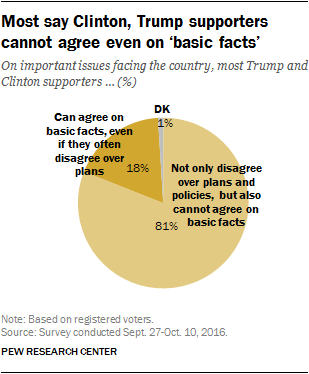
I think it’s time the left give up their designs for both a socialist utopia that requires central planning with concurrent loss of liberties and a world without common and shared agreement of what constitutes reality, facts, and evidence. It has proved empirically costly and highly destructive.
Second, I’m Angry at the Democrats
Robert Reich is correct. We need a new Democratic Party.
I’m not that old, but the Democrats as I understood them in the past were the party of the working people. They supported blue-collar workers, unions, greater equality, social justice for the marginalized, and the underprivileged.
This election cycle, whether factual or not, no one believed that to be the case. “A majority of voters say they are very or somewhat concerned Clinton (62%) would have relationships with organizations, businesses or foreign governments that would conflict with their abilities to serve the nation’s best interests.” I imagine that comes primarily from Clinton’s ties to both Wall Street as a privately paid speaker and Saudi Arabia’s donations to her foundation, among other things. Regardless of the exact reasons, a huge percentage of the American population feels, rightly so in many cases, that their economic situation in rural, white non-college educated areas is worse today than it was yesterday, is likely to be worse for the next generation, and that the direction of the country is seriously off track.





Furthermore, “A majority of Clinton supporters (58%) say they have a hard time respecting a person who supports Donald Trump for president while 40% say they have no trouble doing this.” That seems to imply that the reality the above statistics paint is totally discounted by huge percentages of the Democratic party. Of course, it is hard to determine if what the supporters on the Trump side say is true or not, but it is very difficult to say Clinton supporters voluntarily claim to have no respect for the other side, unless they actually did feel that way. A Democratic Party that has managed to engender that sort of elitist attitude toward the “other” is one that goes against the very qualities I listed above that are aimed specifically at helping the “other”, not looking down on them.
Then there are the issues of actual policy and topics of concern among huge numbers of “middle America” where wages have stagnated for decades and jobs have been lost to foreign producers, free trade, immigration, and automation. Again, it doesn’t seem to matter much exactly how much those factors are causal in the stagnation of middle America. The feeling is there and they have voiced it to deaf ears when it comes to the Democrats. As a result, far more Trump supporters are angry and frustrated that the reality they see isn’t addressed.
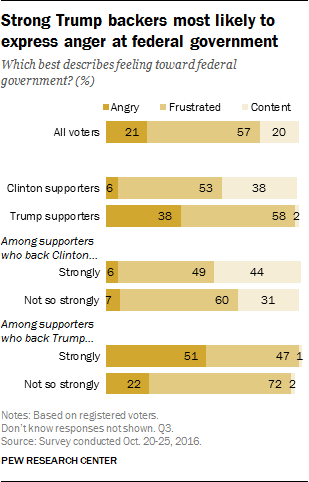
This anger was not addressed at all by the Democratic party. In fact, large majorities of people in the United States believe Clinton would be about the same or worse than Obama, which is not at all inspiring to people who are angry and frustrated at their current and future prospects.
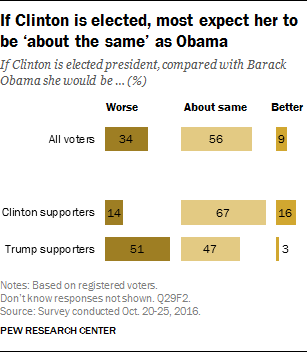
After looking at people’s actual views of their current situation, their anger and frustration with it, and their belief that Clinton would be more of the same it is not difficult to understand the following, otherwise absurd fact: “Far more voters describe her as well-qualified than say that about Trump (62% vs. 32%), and the gap is nearly as wide in perceptions of whether each is “reckless.” Roughly seven-in-ten (69%) describe Trump as reckless”.
This is essentially an admission that uncertainty with a small chance of success is better than high certainty of little to no improvement. “We” would rather take a huge gamble on winning the lottery with a large chance of implosion over sitting around and taking more of the same. I actually can’t think of something more American that. We are a country of pioneers and entrepreneurs with low risk-aversion. Bet it all and hope for the best.
Another Pew survey below shows just how seriously Trump supporters take immigration, terrorism, and job opportunities. These are concerns that should be legitimate in any liberal nation and not ignored. However, in the smug condescension described above, most of the voiced concerns were unheard, not discussed, or dismissed as not central issues. Democrats cannot expect to win an election without compromising on the issues that the entire middle America feel very seriously about.
Addressing those issues would not only gain Democrats single-issue voters by giving those groups what they want, but also provide leeway in not compromising on other less negotiable ones, to which I’ll turn to next.
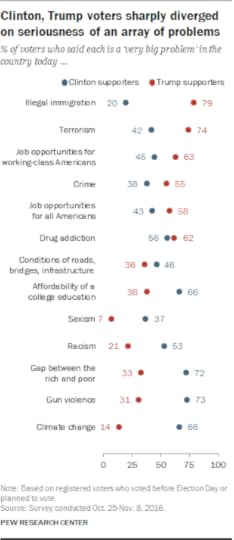
Third, I’m Angry at “The Basket of Deplorables”
Many have taken the stance that we are all on the same team and it is now time to unify because we are all Americans. President Obama stated this recently in a short speech the day after the election ended. This is again where I depart from many on the left. I disagree here.
The left seems to want to wish into existence a world where everyone really does think of themselves as American first and just do what they think is best for it as citizens who disagree. That is clearly not reality and denying that not all voters see themselves as Americans first makes it difficult to identify them and have the needed conversations.
Americanism is essentially an experiment in liberalism. A place where all cherish “life, liberty, and the pursuit of happiness” and there exists a separation of church and state to keep our liberties from being infringed upon.
However, “Exit polls show white evangelical voters voted in high numbers for Donald Trump, 81-16 percent, according to exit poll results.” This matters because evangelicals make up 26% of the vote and have for the past three elections. These are not people that see themselves as Americans first. They see themselves as Christians first, with a duty to actively influence other people’s rights and choices based on their faith. We are not on the same liberal American team.
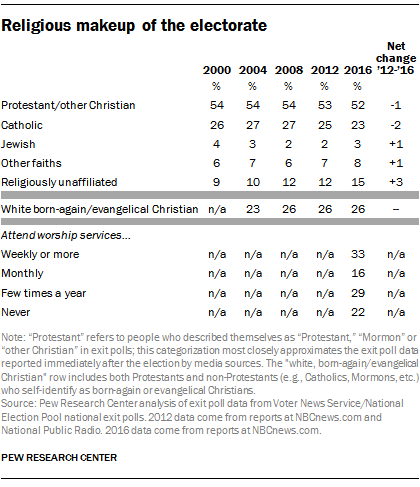
I would also include the groups of people in the graph above on the seriousness of an array of problems in the US that don’t believe sexism or racism to be serious issues, which is by no means exclusive to Trump supporters, but whom did display a disproportionately higher disposition towards racism, sexism, and xenophobia than Clinton supporters.
It is shocking to live in a country where we say that we are all on the same team, the team of liberty and a right to pursue what makes us happy, and to have groups actively seeking to strip rights (i.e. liberties) from women, LGBTQ, Muslims based solely on their religion, and minorities of all colors.
These people are not on our team and we should not support them. Anyone that has sexist, racist, ableist, xenophobic, or bigoted attitudes, beliefs, or behaviors needs to be challenged and decried as un-American. For God’s sake, we have a Statue of Liberty as a national symbol of pride that reads,
Give me your tired, your poor, your huddled masses yearning to breathe free, the wretched refuse of your teeming shore. Send these, the homeless, tempest-tossed to me, I lift my lamp beside the golden door!
Those tired, poor, and huddled masses are real people. Not abstract ones. They need everyone’s help and protection and it is insulting to state or believe that we all agree on that. We cannot be a country that says to them, “you deserve fewer rights than me. You deserve a lesser human experience.”
In Summary
We must discard the left’s ideas of socialism and postmodernism and (re)embrace liberal enlightenment principles of reason, evidence, and objective truth to move forward in our discourse or we will continue to talk past each other.The Democrats must do much more to meet the legitimate needs, fears, and realities of middle America that has seen a stagnant economic climate for a generation and has little hope for a future that embraces automation, migration, and free trade.All Americans need to stop pretending that we all share the same values and respect the same ideals, with liberty being central. Many voters are single issue voters who place God, faith, race, sex, or xenophobia over the welfare of others. They need to be confronted openly and convinced their ideas are not part of modern America.
Published on November 11, 2016 19:16
November 9, 2016
What Needs to Happen Next
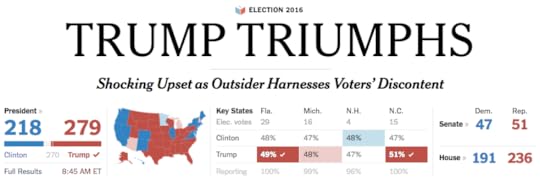
“If someone doesn't value evidence, what evidence are you going to provide to prove that they should value it? If someone doesn’t value logic, what logical argument could you provide to show the importance of logic?” - Sam HarrisI am completely deflated. All air has gone out of me since watching the electoral college counter tick over the 270 mark for Donald Trump today during my fourth period class at work.
It changed me. My outlook is different. The world and the people in it don’t look the same.
My immediate reaction was to post an article from the Washington Post describing how Trump embodies the postmodern value set and this election was essentially a victory for that camp over reason, truth, evidence, facts, and logic.
The American people have clearly stated with their vote that reason and truth are no longer relevant or meaningful. Instead, brute force via identity politics is what matters most and America’s identity was clearly shown.
We are white, male, and fearful. We dislike others and actively berate them. We don’t care about the problems of the world and even try to undermine them by devaluing scientific evidence through aggressive and angry rhetoric.
None of these identity traits are hopeful. There is no love or even faith.
Instead, a complete subjectivism has taken over that gives only “our” identity relative importance. And it has won.
This identity of rage and fear doesn’t know how to make these terrible feelings of anxiety go away and has elected a leader who promises that “only he can fix them”. We have given him and his party complete control over the entire government. The executive, legislature, and judiciary once the supreme court is fully stocked.
This is the same exact situation that gave rise to national socialism. A rabid nationalist movement based on identity politics mixed with a charismatic leader who had a complete plan to fix it - i.e. socialism.
F.A. Hayek described this path beautifully and eloquently as The Road to Serfdom . It is a road paved by a gradual encroachment of freedoms by the “fixer”. Freedoms that have already been threatened in much of Trump’s rhetoric, such as those of the press or religion.
This will not end well and I no longer see it as responsible for liberals to continue to stand by passively and quietly. In our angst over political correctness, decency, respect for others, and the fact that we liberals have made our home on the left, the same place postmodernism has sprung from, we have been paralyzed into a large group of bystanders that have just empowered the most dangerous president elect in US history. And he used the far left’s weapon of postmodern rhetoric to do it.
In much the same vein that 9/11 blasted us into a world that clearly demonstrated an entire group’s complete lack of respect for our values and a willingness to use violence to meet their own ends, this election should result in a similar awakening in us of the very real truth that our facts and progress do not matter to a large group of our fellow citizens. People we thought we understood because they look like us and speak the same language.
If we value our ideals of liberty, love, justice, decency, diversity, dignity, and incremental betterment, then we must admit that we may need to fight for them with tools beyond the ones we are accustomed to using.
As the quote from Harris points out above, we can’t use evidence or logic to combat this group of people’s beliefs. This is a war of ideology and values and persuasive rhetoric will need to be used with brute force and aggression. The many marginalized groups may depend on it for their defense. Doing nothing is not an option if we genuinely care about them and our future.
Published on November 09, 2016 05:46




